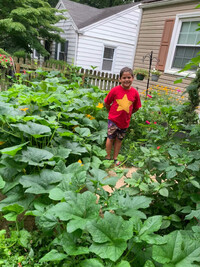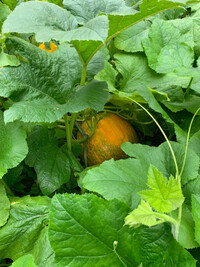Last month I noticed that my neighbor put up a sign in their yard. It's a list of seven guidelines. At the top, it reads:
"...Code of Ordinances allows for managed natural landscapes that include native plantings, meadow vegetation, prairie or rain gardens if the following guidelines are met."
Posting the sign is point number five.
Lawns are interesting things and just like everything else it seems like people either love them or hate them. There's "No Mow May" which is an effort to save blossoms that dapple many lawns in early spring, like clover, for the bees to feed on before other flowers emerge. There's also the "grow food not lawns" movement for those who would rather have a lush vegetable garden in their front yard than turf grass.
My family prefers gardens to grass, so it was an easy "yes" when my son spotted two seedlings that had sprouted in our compost heap in the corner of the yard and wanted to save them. I was pretty sure they were pumpkin sprouts from last fall's front porch decor. He wanted to know for sure, so we lifted them from the compost and planted them where our garden meets the lawn.
Our front yard is fenced in for the dog, so our garden is well defined and contained. I plant flowers close to the house and vegetables next to the fence where they get full sun. It never occurred to me that we could be violating some sort of ordinance with our garden adventure until I saw my neighbor's sign. Turns out that several neighborhoods in my area are challenging gardeners. And it's not just happening in my neck of the woods, either.
Many city regulations, homeowners association guidelines and ordinances are put in place to force gardeners to remove certain plants or maintain a certain amount of grass. It's happening across the country. To counter these, Florida and Illinois have gone so far as to enact "right to garden" laws.
I wonder if I could actually be penalized for encouraging my son's curiosity. I'd hate to think that future requests for what he calls a "surprise harvest" could require me to say "No, we're not allowed."
There has to be a better way. If you want a manicured lawn, fine. But if your neighbor doesn't, what's the harm?
My son's "surprise harvest" is in fact now a full-blown pumpkin patch. It covers all of the space we would have usually mowed. I'm not sure it could be considered a "managed natural landscape." I just consider it our garden.
The garden is something positive we cultivate together as a family and as a community. Why not feed the bees and the butterflies while growing food for your family or flowers for your porch? Children can learn about flowers, bees, produce and even soil science. Gardening engages the five senses, fosters mindfulness, offers a much-needed habitat for pollinating insects and helps us connect with our food.
I cannot wait to see how big this pumpkin patch in my front yard will get. We're lucky to have neighbors cheering us on instead of demanding we take it down. And I have a feeling that transplanting compost seedlings to discover its "surprise harvest" is an annual family tradition that has just begun.
Check out Bonnie's weekly YouTube videos at https://www.youtube.com/bonniejeanfeldkamp. To find out more about Bonnie Jean Feldkamp and read features by other Creators Syndicate writers and cartoonists, visit the Creators Syndicate website at www.creators.com.








View Comments